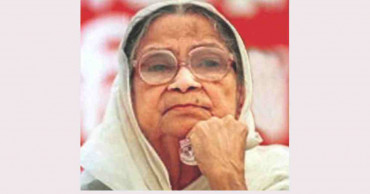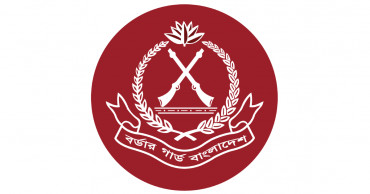observed
Historic March 7 observed at Bangladesh Embassy in Washington DC
The Bangladesh Embassy in Washington DC observed the historic 7th March, commemorating Father of the Nation Bangabandhu Sheikh Mujibur Rahman's landmark speech in 1971, which called the nation to be ready to fight for freedom.
The fiery speech of Bangabandhu on March 7 at a mammoth rally in the then "Race Course Maidan", now Suhrawardy Udyan, inspired the freedom-loving Bangalees to fight and earn the long-cherished independence of Bangladesh in 1971.
The day's program of the Embassy started with the formal hoisting of the National Flag by Bangladesh Ambassador to the USA Muhammad Imran on the Embassy premises in the morning. Officials and employees of the Mission were present on the occasion.
Later, the Ambassador placed a wreath at the bust of the Father of the Nation at the Bangabandhu Corner of the Embassy in the presence of Embassy officials.
After laying the wreath, they stood in solemn silence for some time as a mark of profound respect to the memory of the great leader.
Also Read: Historic 7 March observed in Tokyo
The messages issued on the occasion by President Md. Abdul Hamid and Prime Minister Sheikh Hasina were read out by Minister (Political-I) & Head of Chancery Dewan Ali Ashraf and Counsellor (Political-III) Shamima Yeasmin Smrite.
Later, a video film on the historic March 7 speech of Bangabandhu was screened.
Afterwards, a discussion highlighting the significance of the day was organized.
Taking part in the discussion, Ambassador Imran paid deepest homage to Bangabandhu Sheikh Mujibur Rahman on the occasion of the historic March 7 and highlighted different aspects of his epic speech.
He termed March 7 as an unforgettable day in the history of the nation and said on this day in 1971, Bangabandhu delivered the momentous speech at the then Race Course Maidan (now Suhrawardy Udyan) in Dhaka, effectively declaring the War of Independence.
Realizing the importance of the historic speech, the United Nations Educational, Scientific and Cultural Organisation (UNESCO) has included the speech in its Memory of the World International Register, a list of the world's important documentary heritage, he said.
Ambassador Imran called upon all to work unitedly to build a hunger-and-poverty-free happy and prosperous 'Sonar Bangla' (Golden Bengal), as dreamt by Bangabandhu, under the leadership of Prime Minister Sheikh Hasina.
The day’s program ended with offering a special prayers seeking divine blessings for eternal peace of the departed soul of Bangabandhu as well as Bangladesh's continued peace, progress and prosperity.
First Secretary Md Ataur Rahman conducted the program.
2 years ago
Ekushey observed in Canberra with wider participation of Bangladesh community, foreigners
Ekushey has been observed in Canberra with the wider participation of the Bangladesh community and foreigners.
Around 100 participants including ACT Ministers, Ambassadors, representatives from government offices, multilingual community groups and Bangladeshi diaspora assembled at dawn and spontaneously joined the Probhat Fery with flowers, festoons and banners singing the song of Ekushey “Amar bhaier rokte rangano ekushe February, ami ki bhulite pari”.
Australian dignitaries, including the Australian Capital Territory Minister for Health and Minister for Families and Community Rachel Stephen-Smith, Minister for Environment and Minister for Heritage Rebecca Vasarotti, Shadow Minister for multicultural Affairs Peter Cain, Indian High Commissioner, representatives from the Department of Foreign Affairs and Trade (DFAT) and from the Department of Home Affairs and above all Bangladesh community members passionately attended the Probhat Fery at the cusp of dawn, said a press release.
Probhat Fery was organised for the fifth consecutive year around Manuka Oval that ended at a makeshift Shaheed Minar at Telopea Park.
After the walk, the ministers and other dignitaries paid their homage to the language heroes by placing floral wreaths at the altar of the Saheed Minar.
The High Commissioner recalled the extraordinary leadership of Bangabandhu Sheikh Mujibur Rahman throughout the language movement to the struggle for freedom and the War of Liberation.
He stated that each of the more than 7,000 languages spoken by humanity is a living repository of knowledge that carries within it a unique expression of thinking and feeling.
Read more: Great Language Martyrs’ Day, International Mother Language Day observed in Seoul
He emphasised on revitalising dying languages and raising awareness of protecting languages.
The dignitaries underscored the significance of Ekushey in securing respect for mother tongue and for linguistic diversity and multiculturalism.
The speakers praised Bangladesh in the global campaign for securing honour for all languages and promoting multiculturalism.
Later, the High Commissioner hoisted the national flag at half-mast at the Chancery premises.
The messages of the President, Prime Minister, Foreign Minister and State Minister for Foreign Affairs were read out.
A Special munajat was also offered for the salvation of the departed souls of the language martyrs and for a peaceful, inclusive and prosperous Bangladesh.
The evening programme for the Bangladesh community commenced with a discussion session on the significance of Ekushey and International Mother Language Day.
The discussion session was followed by a colourful cultural program with songs, dance and recitation of poems that enthralled the audience.
Like previous years, the temporarily installed “Shaheed Minar” at the Telopea Park will remain in place till 24 February 2023 for public viewing and reflection.
The programme generated interest among locals and the High Commissioner was live on ABC Radio Canberra speaking on the significance of Ekushey and the unique way of celebration by the High Commission.
3 years ago
Great Language Martyrs’ Day, International Mother Language Day observed in Seoul
The great Language Martyrs’ Day and International Mother Language Day was observed in a befitting manner in Seoul on Tuesday with the participation of the international community and expatriate Bangladeshi nationals living in the Republic of Korea.
On this occasion, the Embassy in collaboration with the Korean National Commission for UNESCO (KNCU) organized a programme at the KNCU premises in Seoul.
Senior officials from the Korean National Commission for UNESCO, Ambassadors and other diplomats from different embassies, members of civil society, members of different social and cultural organizations and the representatives of the leading print and electric media took part in the event.
During the event, Bangladesh Ambassador Delwar Hossain delivered opening remarks and the Secretary General of the Korean National Commission for UNESCO Dr Kyung Koo Han delivered welcome remarks.
Ambassador Delwar Hossain paid profound tribute to the language martyrs of 1952.
Read more: International Mother Language Day: Tribute from UN in Bangladesh in many languages
He also recalled with deep reverence the outstanding contribution of the Father of the Nation Bangabandhu Sheikh Mujibur Rahman in organizing the Language Movement in 1952 and subsequently steering the nation to independence in 1971.
He highlighted the background of International Mother Language Day and the initiatives taken by the government of Bangladesh for the protection and promotion of mother languages and culture of minor ethnic communities in the country.
The Secretary-General of KNCU Dr Han referred to the commonality in the history of the two countries’ struggle to preserve the dignity of their respective mother languages.
He underscored the need for concerted international efforts in the promotion and protection of the mother languages and cultural heritages.
The envoys of India, Indonesia and Sierra Leone and the President of the Joint Board of South and North Korea for the Compilation of Gyeoremal-keunsajeon delivered keynote speeches highlighting the initiatives of their respective governments in the promotion of multilingualism and multiculturalism.
The keynote speech session was followed by a colourful cultural programme.
The performers from Bangladesh, India, Korea and Colombia enthralled the audience through their performances portraying the rich linguistic & cultural heritage of their respective countries.
Ambassador Delwar Hossain hoisted the national flag at half-mast at the Embassy premises with the presence of Embassy officials and the expatriate Bangladeshis.
A one-minute silence was observed to honor the language martyrs followed by an offering of special prayer for the salvation of the departed souls of language martyrs and for the continued peace and prosperity of the country. Following this, the Embassy officers read out the messages of the President, Prime Minister, Foreign Minister and Hon’ble State Minister for Foreign Affairs. Then, a documentary on the great Language Martyrs’ Day and International Mother Language Day was screened. Discussions were held on the historic background and significance of the day.
Earlier, at the first hour of the day, Ambassador Delwar Hossain paid homage to the language martyrs by placing floral wreaths at Shaheed Minar established at the Multicultural Park in Ansan city.
3 years ago
13th anniversary of Mumbai terror attacks observed in Bangladesh
A number of events were held in Dhaka on Friday to observe the 13th anniversary of 26/11 Mumbai terror attacks to condemn the terror groups and to express solidarity with the innocent victims killed.
A photo exhibition was held at Shilpakala Academy organized by Ekattorer Ghatak Dalal Nirmul Committee. Home Minister Asaduzzaman Khan Kamal in the presence of High Commissioner of India to Bangladesh Vikram K Doraiswami inaugurated the exhibition.
The exhibition highlighted the horrors inflicted by the terror groups through seventy framed photos.
Terror incidents of August 21 grenade attack and Holey Artisan attack in 2016 were also showcased in the exhibition.
Read: Ensure electricity for all remote villagers: Hasina
In another event, theatre artists enacted a drama depicting the Mumbai attack at the city’s Bashundhara Shopping Complex in the evening which was applauded by the huge crowd.
Meanwhile, Muktijoddah Mancha, a platform of descendants of freedom fighters, protested in front of the Pakistan High Commission with banners and placards condemning the role of the Pakistan government in sheltering masterminds of the attacks and calling for global efforts in bringing the perpetrators to justice.
Bangladesh Online Activist Forum (BOAF) organized a discussion meeting titled ‘International Terrorism and Mumbai Attacks’ at the National Press Club in Dhaka.
Read: 26/11: Street drama staged in Dhaka protesting Mumbai terror attack
Besides, a documentary movie was screened at Shahbagh after around two hundred volunteers with candles paid tributes to the martyrs at the Shaheed Minar in Dhaka University.
Hundreds of volunteers in Rajshahi, Chittagong, Sylhet, Khulna, Satkhira, Jashore and Cumilla also organized protest demonstrations, human-chain programmes and cycle rallies to mark the day.
On November 26 in 2008, a group of ten Pakistani nationals trained by proscribed terror outfit Lashkar-e-Taiba (LeT) carried out a gruesome attack on 166 innocent people including foreign nationals from USA, Canada, Jordan, Malaysia, Mauritius and other nationalities. The masterminds behind the attack mainly LeT Ameer Hafiz Saeed and his accomplice Zakiur Rahman Lakhvi had planned and trained the militant cadres.
4 years ago
Sufia Kamal’s 22nd death anniversary observed
The 22nd death anniversary of Begum Sufia Kamal, country's trailblazing woman activist, poet and educationist was observed on Saturday.
The day was observed in a befitting manner by different socio-cultural organisations, unlike last year’s limited programs due to the pandemic being near its peak.
Commemorating the eminent personality, President Abdul Hamid and Prime Minister Sheikh Hasina issued separate massages.
Read: Notable works of Bengali literature to be translated to Korean: KM Khalid
Besides, several socio-cultural organisations including Bangladesh Mahila Parishad remembered the poet on social media.
Bangladesh Mahila Parishad is the organization of which Sufia Kamal was the founding president.
A woman ahead of her time, Sufia Kamal was instrumental in naming the first women’s dormitory of Dhaka University as Rokeya Hall after Begum Rokeya, the legendary educationist who was her own inspiration.
Born on June 20, 1911 at Shayestabad, Barishal to Abdul Bari and Sabera Begum, Begum Sufia Kamal went on to become a civil society leader and a pioneer activist for women’s rights. She played active roles in the 1952 Language Movement, the oppressions against the nation before and during the 1971 Liberation War and every human rights movement in independent Bangladesh till her demise.
Despite lacking formal education during her childhood, she learned multiple languages at her home including Bengali, Hindi, English, Urdu, Arabic, Kurdish and Persian. Her first book of poems, Sanjher Maya (The Eventide Spell), was published from Kolkata in 1938 and praised by legendary litterateur Kazi Nazrul Islam and Rabindranath Tagore.
As a poet and writer, she then went on authoring more than a dozen volumes of poetry and several volumes of short stories, short novels, travelogues, etc. Her journal entries in Ekatturer Diary (Diary of 71) narrated the horrific stories during the 1971 Liberation War. She was the founding editor of Begum, country's maiden women’s magazine.
Read: Bangiya Sahitya Sangskriti Samsad pays tribute to late legends
Sufia Kamal was the founding-chairperson of The Bangladesh Women’s Rehabilitation Board, Bangladesh Rural Advancement Committee (now Brac), and Dustha Punarbasan Sangstha. She was the president of Chhayanaut, Bangladesh Protibondhi Foundation and Nari Kalyan Sangstha.
Sufia Kamal received a large number of awards including the Tamgha-i-Imtiaz (1961), a major national award conferred by the Pakistani government that she returned in 1969 in protest at the then government’s oppressive treatment to Bengali people. Her major achievements include Bangla Academy Award for Literature (1962), Ekushey Padak (1976), Jatiya Kabita Parishad Award (1995), Women’s Federation for World Peace Crest (1996), Begum Rokeya Padak (1996), Deshbandhu CR Das Gold Medal (1996), Independence Day Award (1997), Czechoslovakia Medal (1986) and more.
Besides, the National Public Library in Dhaka is named the Sufia Kamal National Public Library and Bangladesh National Museum named one of its main auditoriums in her honour.
Sufia Kamal passed away on November 20, 1999. She was survived by her three daughters and two sons, including Sultana Kamal, a noted human rights activist and former adviser in the Caretaker government of Bangladesh.
4 years ago
Muslims observe Holy Ashura sans processions
Muslims across Bangladesh are observing the Holy Ashura on Friday, commemorating the martyrdom of Hazrat Imam Hussain (RA), with religious fervour and solemnity.
On this day in the Hijri year of 61, Hazrat Imam Hussain, the grandson of Prophet Hazrat Muhammad (PBUH), along with his family members and 72 followers, embraced martyrdom at the hands of Yazid’s soldiers on Karbala maidan in Iraq to uphold the teachings of the Prophet.
Amid the ongoing coronavirus pandemic, the day is being observed in a more muted way as the government has prohibited all processions, including Tajia.
Also read: Holy Ashura to be observed on Friday
4 years ago





.jpg)





